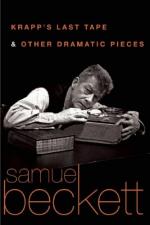|
This section contains 647 words (approx. 3 pages at 300 words per page) |

|
Samuel Beckett and Krapp's Last Tape
Summary: Analyzes a Literary criticism of Samuel Becket by Michael Schell. Compares Krapp to Beckett, and dissects the tone of Krapp's Last Tape.
Michael Schell's dissection of Samuel Becket's work, offers us greater insights to Samuel Beckett as a person and as a writer. Perhaps the most interesting perception Schell offered was the "openness" Beckett used while approaching plot and plot execution. Beckett intended to narrow the gap between theater and reality by emphasizing his character's "mundane drudgery." Schell points out this connection in Krapp's Last Tape, especially with the diminished sense of time. This strays from the conventional ways theater uses to distinguish past from present. Schell also makes a connection between Beckett's style in writing drama and a popular trend among filmmakers in the 1960's. During this era, cinema was moving towards a more visual approach to film.
Written a year after Beckett's death, (but published 8 years after) Schell also made a few good connections between Beckett's death, and some of his dramas.
"I was struck by the open-endedness...
|
This section contains 647 words (approx. 3 pages at 300 words per page) |

|


